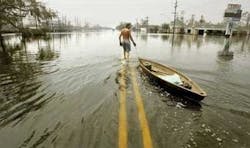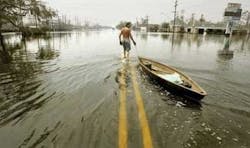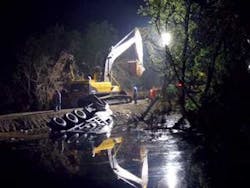Protecting your practice against DISASTER
You can do many things to protect yourself and your practice in a disaster. here’s a checklist.
Dentists in every office learn to work through day-to-day challenges. The job itself teaches us how to deal with emergency cases and unexpected occurrences with patients. Being part of the dental community has taught us to react rationally and quickly during dental crises, but we must prepare for another form of crisis - natural disasters.
Many events can destroy electronic and paper files and even the physical structures of our practices. The destructive power of hurricanes, particularly Katrina and Rita, still weigh fresh on our minds. Natural disasters can happen anywhere at any time - not just hurricanes, but floods, fires, earthquakes, tornadoes, and even man-made disasters such as those on Sept. 11, 2001. Years of work and building a practice can be lost if we do not develop plans to protect ourselves and our practices.
above: A New orleans man ventures into floodwaters after the city issued a mandatory evacuation in response to hurricane katrina.
This article shares tips to protect you and your practice from a disaster. Following them will at least lessen a blow. How will you use saved records and files if you don’t have an office to work from? You also must keep your staff and patients informed during a crisis. There are countless scenarios to prepare for. Your office, like your home, should contain provisions for those who might get caught there before, during, and after a disaster. Your first concern is the safety of anyone in your care. After that, you must preserve documents vital to your practice and that cannot be replaced. There are a few ways to protect documents. First, there is a paperless approach. Second, keep a copy of critical non-cash documents in a fireproof, waterproof container or safe. Keep the safe unlocked so it can be opened and will not be stolen in the event of a break-in. Last, you can’t predict when or if you will be able to return to your building after a disaster. The following checklist will keep you and your office valuables safe and help you plan for a multitude of disasters.
Join the American Dental Association. As a group, dentists are an independent and resourceful group of business owners, but no one understands the day-to-day challenges like the cumulative members of this professional organization. The ADA through its foundation has provided disaster relief and information to its members. Locally, state and component dental associations have provided information to Hurricane Katrina victims. The associations also act as central collection points for disaster recovery information.
Download the Florida Dental Association Disaster Preparedness and Recovery Manual from the ADA Web site, www.ada.org. Through the Florida Dental Health and the ADA foundations, the FDA prepared a manual after experiencing four hurricanes last season. This manual is full of tips to help before and after natural disasters.
Prepare a phone tree for yourself and your office staff. This should list all addresses, land lines, and cell phone numbers of members of your office. List yourself first. Each person must call the member below him or her. The phone tree eliminates duplicate calls, which could deplete cell phone batteries if electrical power were unavailable.
Prepare a “go bag” for your home and office. This could save your life. Everyone has heard horror stories about FEMA and other agencies’ responses after Katrina. Do not count on receiving help for up to 72 hours after a catastrophe hits. Keep a duffel bag with water, food, clothing, and necessary medical items in an easily accessible place. You can also insert in the bag a list of items you should be able to quickly assemble. Use your ATM card before a disaster if possible. Purchase a few plastic gas cans, and place an empty one in your car. Fill all cars with gas, including ones you leave behind. Place gallon jugs of water in your freezer prior to leaving for use as drinking water. It will melt during a power outage.
Prepare a “go box” for the same reason. This is a plastic box available at any office store that can hold vertical files, so you can quickly grab from your filing cabinet all important paperwork, backup tapes, and installation disks for your server. Also, purchase a large, plastic, waterproof bin in which you can store items such as lab cases, the computer server itself (if you do not take it with you), expensive high-tech equipment, and other items that could be subject to fire or water damage.
Update your insurance coverage, and review annually with your agent. Have adequate replacement cost coverage for facility and dental equipment, and purchase flood insurance if you are in a federally designated area. After a hurricane hit one of the author’s offices, the office suffered carpet damage from a water surge. Had he not had that separate policy, the wind portion of his insurance would not have covered the damage. Inventory all equipment, down to the last hand instrument, on a spreadsheet program. List each item, its cost, and the year you purchased it. Take digital pictures inside and outside to document the property before and after the disaster. Pay particular attention to business interruption insurance, including valued practice income insurance if offered by your carrier. The policy will provide funds for records, reconstruction, staff salaries, etc. There are many exceptions, deductibles, and conditions, so make sure you are familiar with the details.
Consider an alternative dental license in another state. More than 40 states grant licenses by credentials. Nevertheless, many require five years of experience, which excludes new dentists. If we have another natural disaster in the geographic proportion and severity that Katrina was, the chances of providing dental care to local areas will be remote for several months or a year, at least. Dentistry for patients - except for emergency care - takes a backseat for months, if not years. A year later, Floridians still see areas that have not been rebuilt after the hurricanes of 2004, and some people have not returned for their preventive maintenance visits. Being licensed in a state away from an affected area acts as a hedge in case your office were incapacitated for an extended time. With several licenses, you have more opportunities, and you would be of greater value to a national Locum Tenens group such as Forest Irons & Associates for temporary employment. Every state board should look at emergency licensing. Many states have already expedited temporary licensing for dentists and hygienists who were affected by Katrina.
Establish a business line of credit with your bank before a disaster. All small businesses have monthly fluctuations of cash flow, and a line of credit can help you avoid the inevitable cash flow crunch you will experience at the onset of a natural disaster. You should also have a platinum credit card with zero balance that is reserved for disaster expenses to help you track expenditures that may be reimbursed or tax deductible. Link all invoices to a credit card if possible. Use a payroll service that will direct deposit payroll checks to avoid distributing paper checks. Consider switching to direct deposit now.
Form an agreement with a local contractor to inspect your home and office immediately after a disaster. In case you have evacuated, contractors will be among the first allowed in to inspect home and office damage, and they can make quick repairs or adjustments while you are away. Do not attempt home projects if you have never attempted them before. Your disability insurance carrier will be happy to know you are staying away from chainsaws, roofs, etc. It is much more cost efficient for you to produce dentistry and make money in another location while you pay somebody for the repairs than to attempt to do it yourself. Gloved hands quickly blister when wielding hand tools. You need to be fully productive once you get back to work.
Purchase a laptop with wireless capability and load it with MS Office and QuickBooks. Network it with your office server and make a final file update before leaving your office with it. You might need to work out of your office for a while, and all your information - including a vendor contact list - will be helpful. E-mail and Internet access could be your only communication. Cities will have the status of the area posted on their Web sites.
Ask your tax preparer to give you an electronic copy of your tax returns and other important annual reports that you can burn to a CD. (Or, scan the ones you already have.) Also, have a record of your business federal tax ID number. (Also record your state payroll numbers and sales tax number, if applicable.) See if your CPA and other advisors have emergency plans to protect your archived tax files and abilities to provide you with copies in an emergency.
Keep a record of all bank, credit card, and brokerage accounts and their account numbers, as well as their customer service telephone numbers. Store similar information if you use an outside payroll service company.
Even if you do not intend to use it, establish a user name and password with the online software offered by most banks, credit card companies, payroll service companies, and investment custodians. This allows you to access your accounts electronically. Consider using a free or inexpensive program such as www.roboform.com to keep the aforementioned account information and passwords encrypted in one place.
If you are not going to make daily backups (including periodic, full-system backups), then use an online backup service. (Do a Google search for “online backup” for some resources). If you do make daily backups, store the backups in a safe area or container.
If you run your accounting program or other important programs on just one desktop vs. on the server, include those files in your automatic daily backup. (Ask your computer guru to set that up for you and to make sure your backup software can back up a workstation along with the server.)
Even if you do not like the idea of going paperless, consider adopting a compromise program to go “less paper,” at least. This means you would scan selected documents routinely so they can be stored and accessed electronically. For instance, as you purge your charts, you might scan their contents. (There are outside resources that can do high-volume scanning for you.)
You may take many avenues to protect your business from disaster or lessen the impact. When it comes to insuring something as important as your practice, you can never be too early or too careful. Whether you choose to go paperless, protect your documents from the elements and any crisis. Download the Disaster Preparedness and Recovery Manual (www.ada.org) for additional information on how you can better prepare yourself and your practice to survive a disaster and minimize loss. Do not let a disaster catch you off guard. By preparing now you will save expenses and headaches in the future. Remember, after the disaster, you must be ready for the long recovery.
Charles Blair, DDS, provides dental-consulting through Dr. Charles Blair & Associates near Charlotte, N.C. Reach him at [email protected].
Richard A. Huot, DDS, is a private practitioner in Vero Beach, Fla., and founder of Beachside Dental Consultants, Inc. Reach him at [email protected].
Rick Willeford, CPA, MBA, has specialized for 30 years in financial planning, tax, and transition strategies for dentists. Reach him at [email protected].


